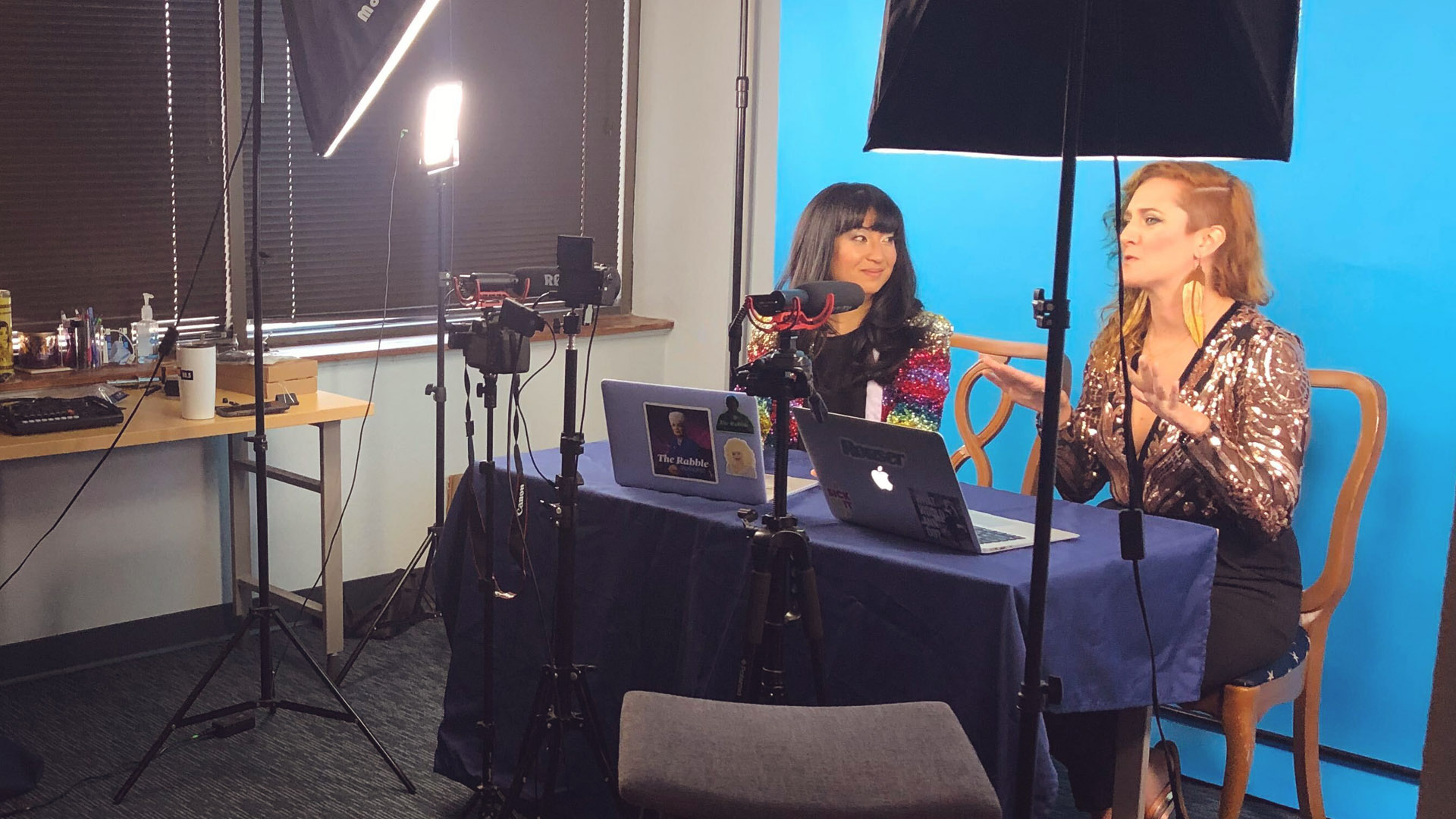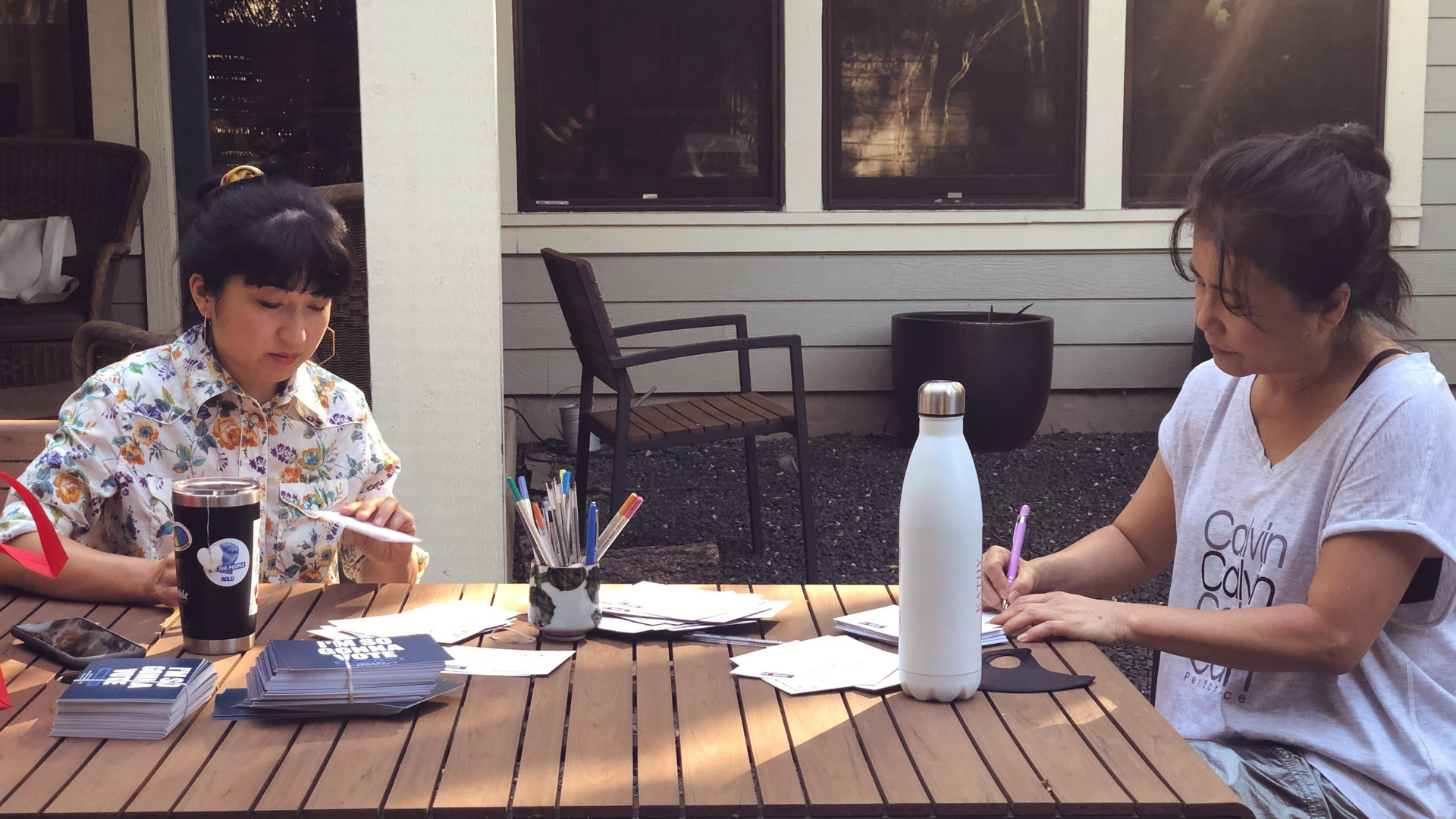Becoming The Rouser
Ashley Cheng has found her voice and is using it.
“There is that really deeply ingrained model minority myth in me that that feels like you should kind of, you know, stay in your lane and you don't want to be disagreeable,” Cheng says. “You don't want to upset anyone. You want to be respectful. You know, in many ways, those are all really great values to have, but when it comes to politics and trying to smash the patriarchy, those aren't really useful qualities.
It's Friday morning and Cheng just wrapped an interview with Kevin Ford, director of “THE PUSHBACK” documentary, which highlights the rise of progressive voices in Texas in 2018. At 1 p.m., she poses in front of the Texas Capitol in a photo shoot for an upcoming profile in Tribeza magazine about her political work. Last week, Cheng co-hosted the Texas Democratic Party’s virtual Johnson-Jordan Dinner, which boasted speaking guests former Secretary of State Hillary Rodham-Clinton and comedian Hasan Minhaj. Cheng is doing all of this work in hopes to mobilize Texas voters.
The Rabble podcast co-host Ashley Cheng wraps an interview with Kevin Ford, director of “THE PUSHBACK” documentary, which highlights the rise of progressive voices in Texas in 2018, at home on October 2nd, 2020.
“We're trying really hard to figure out ways to communicate to new audiences who political candidates might not have the capacity to reach out to on their own or who different political parties might just be ignoring entirely,” Cheng says.
Cheng is also the co-host of The Rabble podcast, which seeks to demystify the voting process for Texans. She co-created the podcast in 2019 with her business partners, Becky Bullard and Kristen Gunn. The three, who all have a background in marketing and communications, operate a politically-geared communications company called Rouser that hosts political events, produces the podcast and ultimately hopes to turn Texas blue.
“We are Texas politics meets funfetti with a side of this is how you get stuff done. We're all about making it really easy and approachable for people to understand how to get involved civically on a local and on a state level here in Texas,” Cheng says.
The Rabble podcast co-hosts Ashley Cheng (left) and Becky Bullard (right) virtually host the Texas Democratic Party’s annual Johnson-Jordan Dinner, from the Party’s headquarters in Austin, TX on September 24th 2020.
At the time the podcast was created, the Rousers were political newcomers and were genuinely learning about the political process along with their listeners.
“We knew exactly how to talk to folks who we were trying to reach, who needed to get more involved. We wanted to hold their hands through the process because we equally needed that handholding,” Cheng says. “I think the more people can provide resources like this to demystify these issues that seem so hard to grasp, we're all so much better off for it.”
Cheng is an Austin native and the youngest daughter of five siblings in a family of restaurant owners. Her grandmother, Linda Cheng, opened Sisters on Burnet Road in 1970 and her father, Ronald Cheng, opened the original Westlake location of Chinatown in 1983. Other locations of Chinatown have opened and closed since.
“I always joke that I grew up crawling around the floor of my parents' Chinese restaurants... We have a really massive family, a lot of folks who live in Austin and cousins who live in Houston, and so that was my primary community growing up,” Cheng says.
The Rabble podcast co-host Ashley Cheng (left) is photographed by Tribeza magazine photographer Moyo Oyelola (right) at the Texas State Capitol on October 2nd, 2020 for an upcoming story. The magazine is writing a feature story about Cheng’s political work.
Ronald Cheng immigrated to the U.S. from Taiwan in 1969 when he was 11 years old. He was part of a wave of immigration after the 1965 Immigration Act removed national origin quotas put in place during the 1920s that limited immigration from Asian countries.
While studying abroad in Taipei at the National Taiwan University, Ronald met Yun-Hua Lien. The couple married in 1977 in Taiwan and moved to Austin to open a restaurant and raise a family. They separated when Ashley Cheng was 10 years old and later divorced. Cheng’s mother took over the Chinatown Westlake location while her father managed the Chinatown North Central location.
“I didn't see that much of my mom growing up. We didn't talk that much about politics because I grew up in a family with a single mom who ran restaurants ... and spoke English as a second language. I always thought my mom was really apathetic about politics. She had never voted and I just thought that she just didn’t care,” Cheng says.
The Rabble podcast co-host Ashley Cheng (left) and her mother, Yun-Hua Lien (right) write postcards to send to Asian American and Pacific Islanders encouraging them to vote.
Cheng and her family are part of the more than 80,000 Asian Americans who call Austin home. More than 8% of Austin’s population is Asian American, yet no Asian American currently holds a position on city council.
“We've never had an Asian American Congress person that we've ever sent from Texas, which is wild to me, you know. We represent like 5.5% of the electorate, which isn't nothing. I mean, in a lot of races, statewide races too, that's the margin of victory,” Cheng says.
Outreach is also an issue. Since 2000, the number of registered Asian American voters has grown by 850,000 every four years. Yet, the 2018 Asian American Voter Survey reports that nationally, during the 2018 election, only 1 in 2 Asian Americans reported being contacted by the Democratic Party and an even fewer 40% reported being contacted by the Republican Party. And the 2020 survey reports “many Asian American voters are still not getting contacted by either party”. The survey also states high rates of limited English proficiency make it harder for this community to receive news and information.
“I never realized that my mom didn't vote because she didn't know how to. Think about how intimidating that whole process is when English isn't your first language. She actually follows the news so closely. She's flown back to Taiwan so that she could vote because that's how much she loves voting,” Cheng says.
As Cheng began to get more involved in local and state politics with her Rouser business partners, the idea of doing a political podcast wasn’t something she originally had in mind for herself.
“I was really resistant to doing the podcast. ... I was like, I don't know. I was still very much like, I don't really like public speaking,” she says.
Cheng says the model minority myth of Asian Americans being seen as polite, law-abiding and being able to achieve higher levels of success made her hesitant to speak out politically.
“I think at the time I didn't realize how much of that was like internalized racism that I've been carrying my whole life of not wanting to speak out or speak up for myself,” she says.
The model minority myth perpetuates the idea that all Asian Americans are doing financially well in society. A Pew Research Center study in 2018 shows income inequality in the U.S. is rising most rapidly among Asian Americans.
“We're not a monolith. There's such richness and variety of cultures who are represented as AAPI [Asian American Pacific Islander]. Many get left out of conversations because they might not have as high socioeconomic status as other members of the AAPI community. You really have to desegregate the data to understand what AAPI issues really are,” Cheng says.
The Asian American electorate is a diverse group. In Austin, Asian Americans trace their roots back to a wide range of countries including India, China, Vietnam, the Philippines and South Korea. And party identification among this group varies. According to the 2020 Asian American Voter Survey, about 38% of Vietnamese Americans identify as Republican, while 54% of Indian Americans identify as Democrats.
After the 2016 election, Cheng became more politically active, holding fundraisers for Texas Democratic candidates and joining the Democratic National Committee as a member representing the Asian American Pacific Islander caucus.
“After the 2016 election...I became a volunteer deputy registrar, largely so that I could register my mom to vote,” Cheng says.
In 2018, Cheng took her mom, Yun-Hua Lien, to vote for the first time. But when they arrived at their local polling place, Lien was told she wasn’t on the voter roll. She was instead given a provisional ballot, which is counted only after a voter’s eligibility has been confirmed.
“It's just infuriating, how eye opening that was for me. How many stories like that exist? ...especially in the state of Texas...of people losing the right to vote and the amount of intimidation that occurs intentionally to stop people from voting,” Cheng says.
Despite these barriers, 2020 is seeing an increase in eligible Asian American voters. More than “11 million Asian Americans are eligible to vote this year making up nearly 5% of the nation’s eligible voters.” That’s why Cheng has been more politically active, helping fundraise for local Asian American and Pacific Islander candidates running for office.
“I've gained a lot more confidence in using my own voice and just having a lot more self respect for my own opinions and my own story,” she says.”If I just keep showing up when I'm asked, maybe this will be useful for someone else to see.”
To learn more about Ashley Cheng and The Rabble podcast, visit their website at rousertx.com.
Community journalism doesn’t happen without community support.
Got story ideas, advice on how we can improve our reporting or just want to know more about what we do? Reach out to us at news@klru.org.
And if you value this type of reporting, then please consider making a donation to Austin PBS. Your gift makes the quality journalism done by the Decibel team possible. Thank you for your contribution.
More in Politics:
See all Politics posts









Contact Us
Email us at news@klru.org